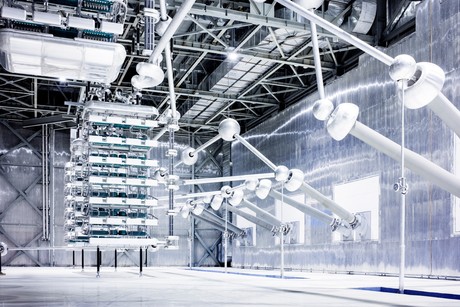ABB secures long-distance power transmission link project

ABB has teamed up with India’s national electricity grid operator, Power Grid, in a mega project worth over $640 million for the delivery of a transmission link that will have the capacity to bring reliable electricity to more than 80 million people.
The Raigarh-Pugalur 800 kilovolt (kV) ultrahigh-voltage direct current (UHVDC) system will connect Raigarh in Central India to Pugalur in the southern state of Tamil Nadu.
The 1830 km link will be among the longest in the world. With a capacity of 6000 MW — the equivalent of more than six large power plants — it will be enough to meet the electricity needs of over 80 million people in India. The two-way link will integrate thermal and wind energy for the transmission of power to high-consumption centres located thousands of kilometers away, supporting electricity demands in the south (when wind strength is low) and transmitting clean energy to the north (when there is excess wind power).
“ABB is honoured to partner with Power Grid for this smart long-distance transmission project,” said ABB CEO Ulrich Spiesshofer.
“Delivering reliable electricity to India’s energy demand centres is a top priority for the Indian Government to support the country’s impressive growth momentum. ABB is strongly committed to India for more than a century and, with this new long-distance transmission link, we are delivering the benefits from the energy revolution to the country building on the strength of our strong local manufacturing footprint. With our state-of-the-art UHVDC technology, we enable the balancing of renewable and conventional electricity supply over long distances in a smart and reliable way,” Spiesshofer said.
UHVDC transmission is a development of HVDC, a technology pioneered by ABB more than 60 years ago. ABB has been awarded about 110 HVDC projects, which represents a total installed capacity of more than 120,000 MW and accounts for around half the global installed base.
HVDC transmission links help to conserve land, as they occupy only one third of the space compared to the alternative. In this case, that amounts to a saving of approximately 244 km2 of space — around one third of the area of Bangalore or the entire city of Kuala Lumpur. The mega project will also feature technologies selected to minimise the footprint of the transmission stations.
The project is expected to be completed in 2019.
Hospital workers call for reliable power
A coalition of over 100,000 health workers is urging the federal government to invest in...
Draft rule to reduce risk of power outages
Over the past few years, hundreds of thousands of Australians have been affected by long-duration...
NEM's 'vital link' secures high-voltage tech
Hitachi Energy is providing high-voltage circuit breakers for Transgrid's HumeLink project,...




